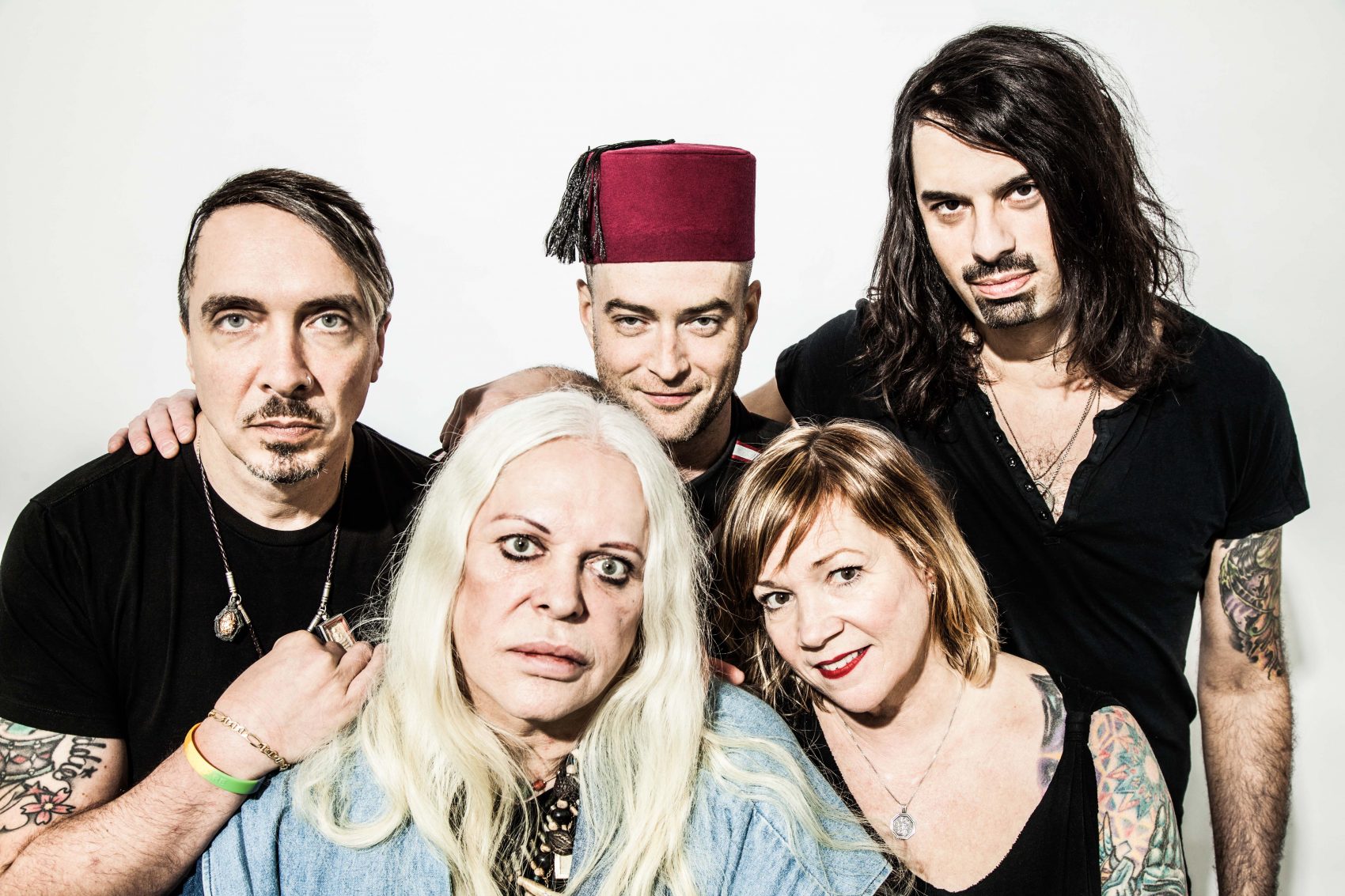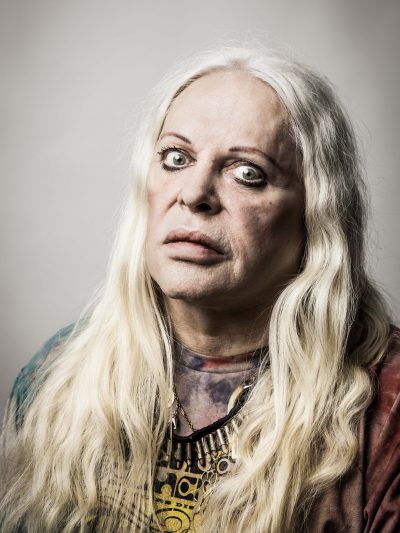Advertisement
Going Up Against The Status Quo 'At Any Given Time,' Psychic TV Continues To Evolve

Genesis Breyer P-Orridge, leader of Psychic TV, is on the phone from h/er Lower East Side apartment in New York explaining the evolution of the band s/he started in Britain about 35 years ago. "At any given time, we’re almost like a contradiction to what the status quo is. And that’s why our current slogan is 'Pleasure is a weapon.' " (I’ll get to why P-Orridge uses those pronouns a bit later.)
Psychic TV brings its psychedelic music and video show to Brighton Music Hall on Saturday, Dec. 10, and singer-violinist P-Orridge lays out what they hope to bring to the party: “We celebrate connections of love, having a chosen extended family, and being rewarded with that knowledge that there are other people that do see the way that you do and feel a warmth and connection, and love for those who try and maintain some constructive values in this really twisted and confused world we live in.”
"We celebrate ... love for those who try and maintain some constructive values in this really twisted and confused world we live in."
P-Orridge
All of which stands in sharp contrast to my first live exposure to Psychic TV in Boston back in 1984. In the Boston Globe, I wrote, "Dark and doomy expressionism is one thing. An obsessive, brutal, repulsive assault of sado-masochism is another. [The] multiscreen display of horrific sex and violence made the gorge rise, driving numerous persons from the theater into the lobby. The video grotesquerie ranged from images of Charles Manson and Jim Jones to scenes of self-mutilation and self-immolation. … If hell has an audio-video department, Psychic TV are its programmers."
P-Orridge, who was born Neil Megson 66 years ago, recalls the "if hell has an audio-video department" line and wryly notes, “It was a very good quote, almost as good as ‘wreckers of civilization.’ ” (A member of the British Parliament used that term after a controversial show with P-Orridge’s earlier proto-industrial rock band, Throbbing Gristle, in 1975. The band immediately used it on a promotional flyer.)
Controversy has long been part of P-Orridge’s world. In 1992, there was a media-generated firestorm in Britain, unfounded charges of Satanism and child abuse, resulting in a police raid. “There was a conspiracy because they didn’t like what we were saying or that so many people were listening,” s/he says now.
P-Orridge, first wife Paula and their two daughters moved to a small town in California’s Sonoma Valley. The couple divorced in the early '90s and, soon after, P-Orridge moved to New York, where s/he still lives with h/er dog, Musty Dagger.
The next time I saw Psychic TV, in 1990 at the late Channel club, the sound and vision had turned around if not 180 degrees, maybe 150. They’d had a melodic alt-rock hit with “Godstar” in 1985, a song about the Rolling Stones late guitarist Brian Jones.
In concert, Psychic TV served up a gumbo of acid house, industrial dance rock, straight-ahead pop, sound collages, psychobabble and, mostly, massive, groove-centered psychedelia. And judging from their latest recorded work, including the EP, “Alienist,” Psychic TV thrives in a somewhat happier place. Not one without tension, mind you.
"Situations change and our work, even if it’s oblique and sometimes not overly obvious, is a reflection of the world as we see it at any given time," P-Orridge says. "So, when we were in the midst of Reaganomics and Margaret Thatcher, we had a rage against the inequity of the double thinking, the hypocrisy and the bigotry of the people who had power at the time, the politicians and the corporations. So, our response to that was to create a music that was a mirror to the corruption we saw.
“But things change and strategies change and any good artist or creator will shift and adjust to continue the dialogue with the situation they perceive. You imagine, as an artist, there’s childhood, where you could say Throbbing Gristle was childhood, mucking around in the mud and the filth and playing with things and throwing them around to see what they do. Then, later on with early Psychic TV, that’s adolescence, where you start to create your identity and start to think about what your place is within a culture. And now we’ve become grown-ups and the response to what we see is [that] the only way forward is through collaboration, through collectivity, through kindness and sharing and conditional love.”
"Now we’ve become grown-ups and the response to what we see is [that] the only way forward is through collaboration, through collectivity, through kindness and sharing and conditional love."
P-Orridge
In the ‘80s, one of P-Orridge’s primary collaborators was his first wife Paula; later it became his second wife Jacqueline "Lady Jaye" Breyer, who died from cancer, or as P-Orridge puts it “dropped her body,” in 2007.
After her death, P-Orridge began placing her surname in front his and prefers to use “s/he” as a self-referential pronoun. P-Orridge explains that it “is primarily a sign of respect to my beloved Lady Jaye. It’s also saying the binary way of seeing the world is what causes violence, intimidation and conflict. The old way of seeing things is flawed. We should always be looking for the unity in things instead of the differences. So s/he is saying he is she and she is he. In other words, we are all just beings. The gender is irrelevant; the identity is the one you should try and create for yourself by yourself and the narrative of your own life becomes your own book.”

And they are, s/he says, still working together. Hence, P-Orridge’s frequent use of “we” instead of “I.”
“For me, my belief is Lady Jaye still exists in the immaterial world,” s/he opines, “and interestingly we just posted something on Facebook where quantum physics is saying the consciousness does not end when the body dies. It just goes back into the universe, which is what Tibetans have been telling us for hundreds of years. And ‘we’ represents us both in the material world so the two of us are still working together. We discuss her ideas and we have notes that inspire me still. Hopefully, we’ll continue to work in other dimensions when this body’s gone.”
Earlier this year, P-Orridge staged an art exhibit of h/er and the late Lady Jaye’s work, “Try to Altar Everything” at Manhattan’s Rubin Museum.
There have been many players who’ve gone in and out of the group over the years; Psychic TV rivals Mark E. Smith's ever-changing band, The Fall, in that regard.
“We’ve always said Psychic TV’s music is the sum total of who’s in it at the time,” says P-Orridge, who enthuses about “bringing in new musicians with new skills. If we get a guitarist in it — as we do right now with Jeff Berner — then we have a dynamic we didn’t have before. We can put in wild, psychedelic, unusual solos. When we got a keyboard player, John Weingarten, who plays jazz piano, we can have a jazz piano solo of if we wanted. If we have new tools in the tool kit, now we can do something very different. Let’s not just do what we always do but let that influence what we create. The only people who’ve been in the whole way through — or since the reincarnation [in 2003] are Edley Odowd, the drummer, and Alice Genese, the bass player.”
In recent years, Psychic TV has been releasing EPs with material split between cover songs and originals. On “Alienist,” they do a wild version of Nilsson’s manic “Jump Into the Fire” as well as The Creation’s 1968 U.K. hit “How Does It Feel to Feel” — songs they’ll be playing in Boston. They’ve also covered Pink Floyd, Syd Barrett, Can, Hawkwind, Captain Beefheart, Funkadelic, Jimi Hendrix, the Beach Boys, the Rolling Stones and the Velvet Underground.
“We noticed an immense ignorance of the story of alternative music in rock in the younger people in this era,” says P-Orridge of the decision to do the covers. “In the old days, maybe we’d come across Captain Beefheart, buy a record, go ‘This is great!’ and notice how his music is evolving, changing and becoming more complex, more radical. And we would follow that progression and see it reflected in the alternative culture it came from. Each band was special because they were unique too and evolving in different ways. You would follow these people who somehow represented your relationship with the world outside and the complexities.
“Now, people do everything from Spotifying to downloading to listening to tracks here and there and half of them don’t know who made those tracks -- my own daughters, they don’t know — and they don’t actually have any interest in following a band that has a message. That’s not on their agenda at all. So what we’re doing is saying, ‘There is actually a continuity in this alternative way of making music. And there are certain bands and artists that we feel are really important and have helped us to grow the way we’ve grown. And we would like to suggest you go and check them out.’ ”


